|
The romantically titled The Kiss Before the Mirror certainly opens in starry-eyed, almost fairy-tale fashion. In some corner of Vienna that's as charmingly – but also as disconcertingly – artificial as the key bridge exterior set from William Cameron Menzies' 1953 Invaders from Mars, a well-dressed woman named Lucy (Gloria Stuart) trips her way dreamily through the trees, pausing briefly to appreciate the sweet scent of flowers and to smile at a black cat that the score momentarily suggests is a bad omen. As she enters the home that is apparently her destination, she checks her reflection in a circular, flower-framed water bowl. Elsewhere in the same house, a man (Walter Pigeon), who at this point we can presume is her husband, cheerfully hums to himself as he prepares the details for a planned romantic evening, lighting candles, arranging more flowers, and pouring himself a martini. These two are clearly very much in love.
As the sound of Lucy's piano playing massages his ears, the man dances his way through the house to lovingly embrace and kiss her. "Why the secret entrance?" he asks her, to which she replies, "I wanted to surprise you," then noting happily as she sees the flowers, "Oh, Spring is here." It's then that we get reveal this has been slyly building up to when the man asks, "Did anyone see you?" and Lucy replies, "Not a soul." If the penny hasn't already dropped, their next words should give it a serious nudge. "Does he suspect anything?" the man asks. "Not a thing," Lucy smilingly replies without a whisper of guilt. It's by now clear that these two are having a passionate affair behind Lucy's unsuspecting husband's back, which is confirmed beyond doubt in the risqué conversation that follows.
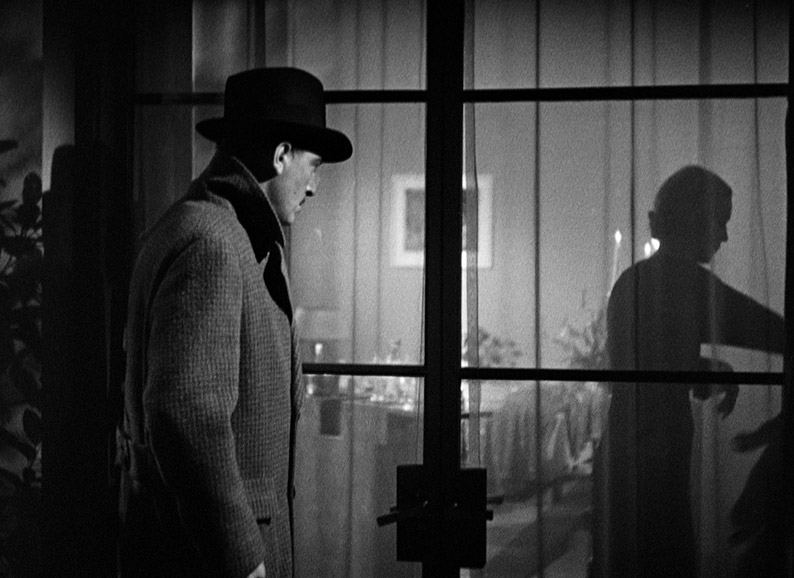
As the two head towards the bedroom, the man leaves momentarily to check on something, and Lucy enters the boudoir and begins to disrobe. As she does so, another initially unidentified male figure approaches and silently enters the house through a side door, then steps quietly back outside, where he observes Lucy undressing through the net-curtained bedroom patio doors. This potentially sinister setup takes a seriously dark turn when the man pulls a revolver from his pocket and shoots Lucy through one of the door's glass panes, then empties a further two shots into her body after she falls to the floor. He then lets himself in, walks over the broken glass and discarded clothing, picks up a telephone receiver and calls the police. "This is Walter Bernsdorf," he tells them, adding "Yes, of the university," as a bit of background exposition. "I am at number 14, Gloriette Street. Will you come and arrest me? I've just killed my wife." At this point we're not even ten minutes into a 69-minute movie. Where, you might reasonably wonder, will it go from here?
Even at this early stage we've been given a few surprises, some of which we can chalk up to the fact that the film was made just before the Production Code began to be heavily enforced. It's all too easy to forget this when watching a film of this vintage, as a year later the very notion of a woman having a satisfying and loving extramarital affair would be forbidden content for a Hollywood movie, and her albeit largely silhouetted disrobing would have been an absolute no-no. As a result, the film instantly feels more modern than it actually is, and just a few minutes in, my interest was seriously piqued. But there's more. Defending Walter on a murder charge to which he has already confessed is his closest friend, Paul Held (Frank Morgan), a renowned attorney who is introduced in a low angle shot as he enters the Public Prosecutor's office that can't help but have heroic implications. He then proceeds to irritate the Prosecutor (Wallis Clark) and amuse the audience by cheerfully discussing the case whilst circling his opponent's desk and fiddling with seemingly every object that he encounters.
After this, he introduces his two-person team, which consists of the sharply dressed office manager, Hilda Frey (Jean Dixon), and middle-aged law clerk, Schultz (Charley Grapewin), and these two prove to be far more than just functional window dressing. A rare female legal representative in a movie at a time when they were also rare in real life, Hilda's interest in the case has a personal edge. "A woman has been killed," she tells the Prosecutor, "That interests me quite a bit." Also intriguing are the only hinted-at details of Hilda's personal life. On the surface, she is all business, from her dress sense to her unemotional assessments and clipped delivery, but when later questioned by Paul's wife Maria (Nancy Carroll) on whether she's a lawyer or "a new kind of woman," Hilda suggests that outside of the office it's a very different story. "By day, I'm a lawyer," she tells her. "At night… Well, you might be surprised." And I'm far from the first one to be struck by the possibility that maybe, just maybe, Hilda's off-duty preference is for women rather than men, first hinted at in the irritated glare she flashes Paul when he jokily suggests that he thought that she might rather like the Prosecutor. It's the sort of queer coding that the film's gay director was fond of sneaking in to his more widely seen and celebrated genre films. I'll get to that fine fellow in a minute. All ambiguity in this area seems to be dropped completely when in comes to the camp court cartoonist, whom his reporter colleague refers to as 'darling' and who bears a passing resemblence to the director himself.
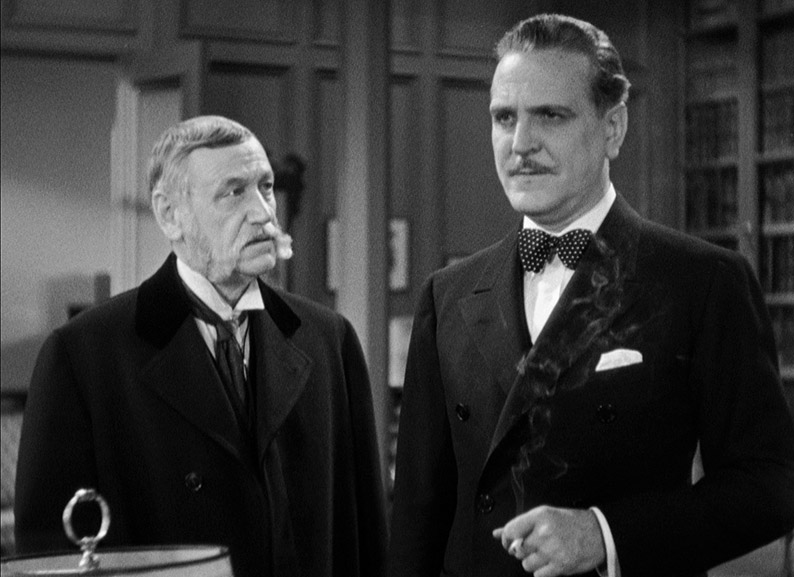
Then there's Schultz, who despite not being given the courtesy of a first name in the film or the cast list, proves an entertaining presence every time he appears. His attempts to philosophise are repeatedly cut short by his exasperated employer, and you have a feeling that he only continues to do this job because he can no longer be bothered to learn another trade at his age. He's quickly defined by his long grey whiskers and tired body language, and the fact that the Public Prosecutor greets him with the telling line, "Hello, Mr. Schultz. Are you still a law clerk?" Ouch. Schultz is not remotely phased by this, however, and when the Prosecutor departs to arrange a visit with the prisoner, we get one of my favourite exchanges in the film:
| Paul: |
"Shultz?" |
| Schultz: |
"Yes, sir?" |
| Paul: |
"You've been drinking again." |
| Schultz: |
"Of course." |
| Paul: |
"Aren't you ashamed of yourself?" |
| Schultz: |
(unapologetic) "No. If it weren't for the alcohol, I'd go to the dogs. Copying these murder papers depresses me, drops me down. A drink lifts me up." |
| Paul: |
"Your life must be a series of ups and downs." |
I have a feeling Schultz and I would get on famously.
Here's the thing, despite all this rich character detail and scene setting, we still haven't got to the real crux of the story. This comes after Paul visits the despairing Walter in his cell and pushes him to remember exactly what took place leading up to the murder. Walter is so distraught by what both his late wife's betrayal and his own lethal response to it that he struggles to recall the night in any useful detail. He does, however, remember the moment that it dawned on him that Lucy was having an affair, as she made herself up in front of her dressing table mirror in preparation for a night out, then reacted badly to his attempt to kiss her. It's a story that really makes a real impression on Paul, so much so that arrives home in a state of extreme agitation, prompting Maria to guide him to her boudoir and make him comfortable on her couch, arranging the pillows. covering him with an eiderdown and offering words of reassurance and support. It's the very picture of the loving and dutiful wife she appears to be, but Paul just can't let it go, and in the process of describing how Walter first began to suspect Lucy, he realises that Maria is currently echoing Lucy's actions of that fateful night. When she starts singing the same song that so haunted Walter – "The whole town sings it, it's the latest hit! It was poor Lucy's favourite tango," – Paul gets to his feet, approaches her, grasps her head, and kisses her firmly on the cheek. Her response is one of anger at having her hair messed up after all the work she has put into it, once again mirroring exactly what took place between Lucy and Walter on the night of Lucy's murder. She quickly calms down and dons a new dress that Paul has never seen, then heads out for what she claims is a meeting with her friend Helen for a game of bridge. By this point, however, Paul is experiencing the same suspicions and emotions as his incarcerated friend, and he secretly follows her. And it turns out that he also owns a revolver…
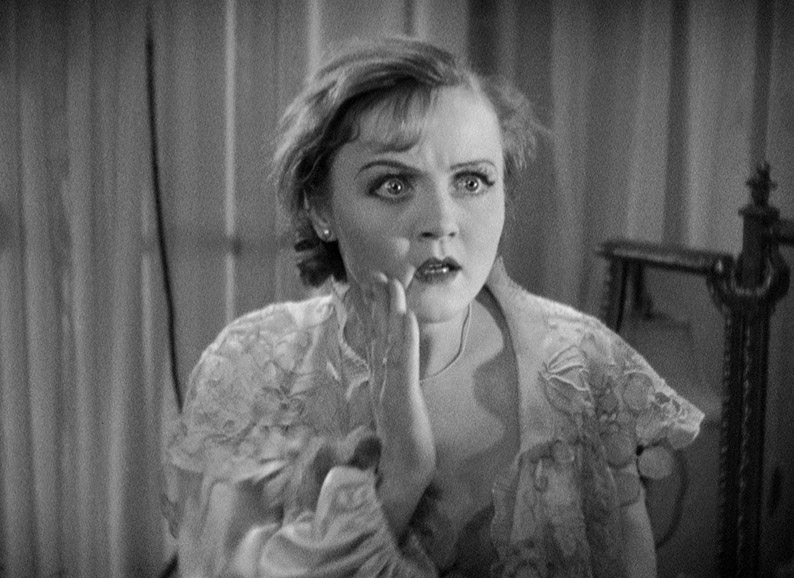
I've probably given more away here than is required, but it's this central dichotomy that becomes the moral question around which the rest of the drama revolves, as well as being the aspect of the film that has aged problematically. Finding himself in the exact same position as the man he is defending quickly changes how Paul approaches the case, his arguments now shaped more by empathy that legal logic, but also – more worryingly – evolving into a test run for his own possible acquittal on a capital murder charge should he elect to follow the same path. Times and attitudes have changed, of course, which makes this aspect of The Kiss Before the Mirror uncomfortable viewing today, as we are asked to feel for men whose love for their wives extends to ownership, with the bonds of marriage punishable by the death penalty if broken. I, for one, found myself squirming when, in a wildly passionate final plea to the jury, Paul attempts to justify Walter's murder of his wife – and by implication his own potential killing of Maria – because of how this betrayal offends their respective husband's honour. It's the sort of ass-backward crap that's still being practiced in some fundamentalist religious societies today, and it angers me every time I read about it. Personal sense of honour, my green goblin's arse. The question you should probably be asking is what it is about the relationship you have with your partner that has prompted her to seek solace in the arms of another in the first place, chum. And Walter and Paul are not the only ones dishing out – albeit contemplating doing so in Paul's case – death sentences without trial for dents to their fragile manhood. In what is intended to be one of the film's more light-hearted moments, Paul says hi to a bruiser of a prisoner named Bill, whom he presumably once represented, and notes that he will soon be up for release. Not so, reveals our Bill, as he recently broke out and murdered his wife and her lover and is now banged up for life. "That's too bad," says Paul without a thought for the murdered couple. "Too bad, nothing," replies Bill, "I'm happy. Wondering where that woman was all that time used to drive me crazy." "Yeah, well you know where she is now," says Paul as he heads off cheerily, to which Bill responds, "I know where I hope she is!" What a guy. It's also worth noting that all of the infidelities in the film are committed by women, casting the menfolk as unwaveringly faithful and casting them by default as the wounded party. Men here are presented as honourable beings, and women just cannot be trusted to be faithful and stand by their man. I wonder how this all would have played had Lucy killed her husband after discovering that he was having an affair.
However…
Countering the film's archaic arguments for uxoricide is the sense – strongly hinted at even before he becomes suspicious of Maria – that Paul's desire to emulate his close friend's drastic actions is not the product of rational thinking, but an ego-driven refusal to face up to the fact that his perfect marriage is nothing of the sort. Nothing about his post-discovery actions feels rational, and while this view may be coloured by my viewing it in a hopefully more enlightened time, the furious passion of his final courtroom summary comes across as the ravings of a man who has abandoned the rational for the emotional, never a good fit for a supposedly top lawyer. It becomes clear here that he is no longer arguing his friend's case but trying desperately to convince both the jury and himself of his heartfelt but ultimately twisted justification for murder. Underscoring this is Walter's almost unwavering conviction that he really is guilty of a terrible crime and is thus fully deserving of whatever punishment may be handed out to him. He even threatens to plead guilty if Walter does not quit his new obsession, and at one point urges Maria to get as a far away from him as she can, a late effort to make up for his own wrongdoing by preventing another in the same vein. Hilda is also unimpressed with Paul's early proposal for how they should proceed. "Momentary insanity, induced by jealousy," Paul offers as an argument to Hilda. "On that defence, would you acquit him?" to which she replies thoughtfully, "I don't know. As a woman, I would instinctively find him guilty. One shouldn't encourage men to commit murder." Right on. Mind you, she then undercuts this statement a little by suggesting that a man's willingness to murder his wife under these circumstances is somehow a great compliment to womankind. You what?
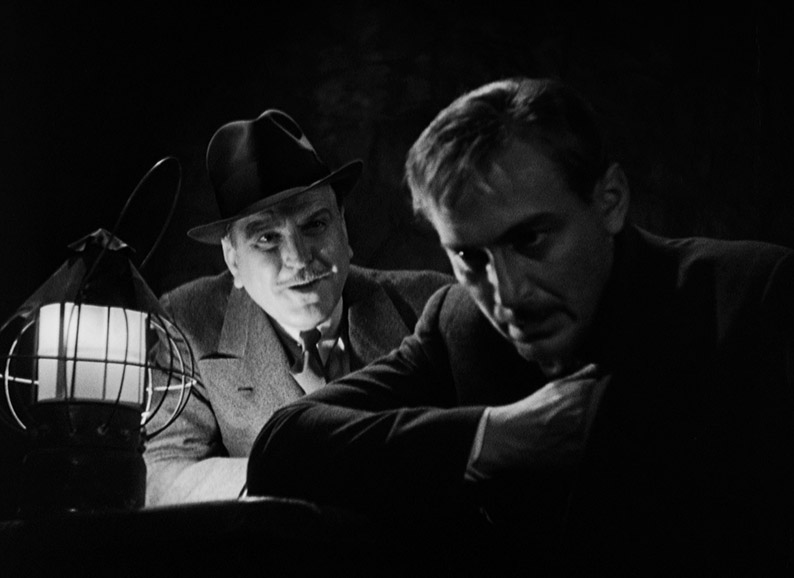
What really makes the film a must-watch, however, lies in the polish and invention of its execution. It's solidly acted across the board, and while both Frank Morgan and Walter Pidgeon get to push it to the limit in fiery monologues that come close to hysteria, in both cases they feel just right for the scenes in question. The screenplay by William Anthony McGuire, from an original play by Ladislas Fodor – a Hungarian playwright who went on to pen screenplays for Tom Thumb (1958), Grand Hotel (1959), and a string of post-Fritz Lang Dr. Mabuse sequels – is consistently excellent, with some really sharp exchanges and one-liners enlivening scenes that could otherwise have been little more than functional. And for anyone not already aware, the film was directed by talented British émigré James Whale, and was sandwiched between two of the horror classics for which he is still best remembered, The Old Dark House (1932) and The Invisible Man (1933). It was apparently Whale who insisted on the hiring of master cinematographer Karl Freund, and the two work together here as if they were artistically bonded at birth, their dual fondness for moving and angling the camera with real purpose delivering in spades here. Prime examples include Paul's aforementioned authoritative low-angle introduction, the quick pans from characters to objects of relevance and back, a 360º pan around the courtroom at a key moment, and the extraordinary shot when Paul recalls Walter's words, and the camera follows his accusing finger as it scans the room and ends up pointed at Maria as she makes herself up in front of the mirror.
The film is peppered with expressionist touches, in the moody use of light and shadow in Paul's cell, in the breaks with realism of Charles D. Hall's impressive set design, and most directly in Walter's flashback to the moment that he realised his wife was having an affair, where the image pulses and distorts as if the dressing table mirror in which Lucy and Walter are framed is about to explode into a thousand angry pieces. Mirrors and reflections feature prominently throughout, their role in the narrative leant further gravitas by their subtextual significance, as characters leading double lives or revealing a very different side to their personalities repeatedly contemplate their reflections or those of someone close to then that they have come to distrust. And while I have no intention of revealing how the film ends, the role of the dressing table mirror there provides the film with an impressively and teasingly effective ending, one whose refusal to provide a clear-cut resolution is partly down to the direction, the cinematography, and the suggestive and even symbolic use of that mirror.
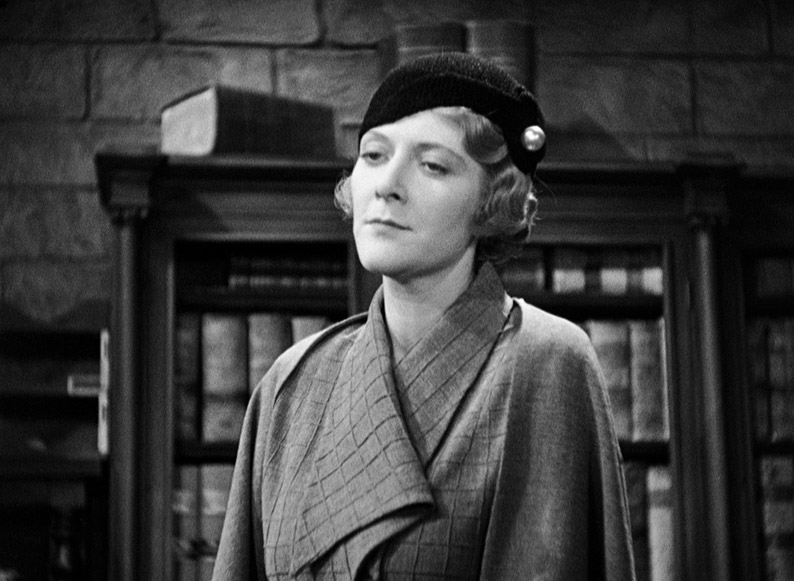
As a confirmed lover of James Whale's celebrated horror quartet, I'm always excited when one of his less well-known films is unearthed and restored for home viewing. Time has exposed some of the content for the patriarchal claptrap that it frankly always was, but as a slice of cinematic storytelling it's really something, and it does move steadily towards favouring the more humanitarian notion of forgive and forget, even if you have to go through emotional hell to have a chance of getting there. It sees Whale at close to his career peak, anticipates the shock story reset of Psycho by 17 years, and I, for one, would be happy to watch another couple of films that feature Hilda and Schultz as supporting characters. I'd love to know more about Hilda in particular, and she is gifted with some devilishly good lines. When noting that Lucy wore a new dress the day she was killed, she remarks to Maria, "If one's going to be murdered, it's nice to be dressed for it." A short while later, as she gets up to leave after being given the afternoon off, Paul remarks, "I'm curious to know what a lady lawyer does with her spare time," to which Hilda replies, with an inscrutable grin, "Probably forgets that she is a lawyer, and sometimes forgets that she is a lady." Go girl!
Sourced from a 2020 restoration from a 2K scan, the 1.37:1 1080p transfer here is in most impressive shape for a film of this vintage. The contrast is nicely graded, with solid black levels but decent shadow detail where appropriate (the deep black shows in Walter's cell are clearly intentional). The image is largely clean of dust and damage, and the level of detail is consistently good. A most attractive transfer.
There's an unsurprisingly narrow tonal range to the Linear PCM 1.0 mono track, and there's some fluff and hiss in the background, and while for the most part it is not distracting, it does occasionally take a small jump in volume. Crucially, the all-important dialogue is always clear.
Optional English subtitles for the deaf and hard of hearing are available, as we have by now come to expect.
Audio Commentary with Nora Fiore
Film historian Nora Fiore, aka the Nitrate Diva, provides an appreciation of the film so smoothly seductive in its delivery that it intermittently borders on a sales pitch, but it always makes for enjoyable listening. There's plenty of revealing information here, including details on several of the actors and filmmakers, the promotional gimmicks used to sell it, and lines and sequences that were cut by various state censor boards. She includes her own, often intriguing interpretation of individual sequences and shots, passes comment on Whale's own remake (more on that below), quotes from audience comments at the preview screenings, and even schools us in the outrageously lenient nature of the Austrian legal system of the day.
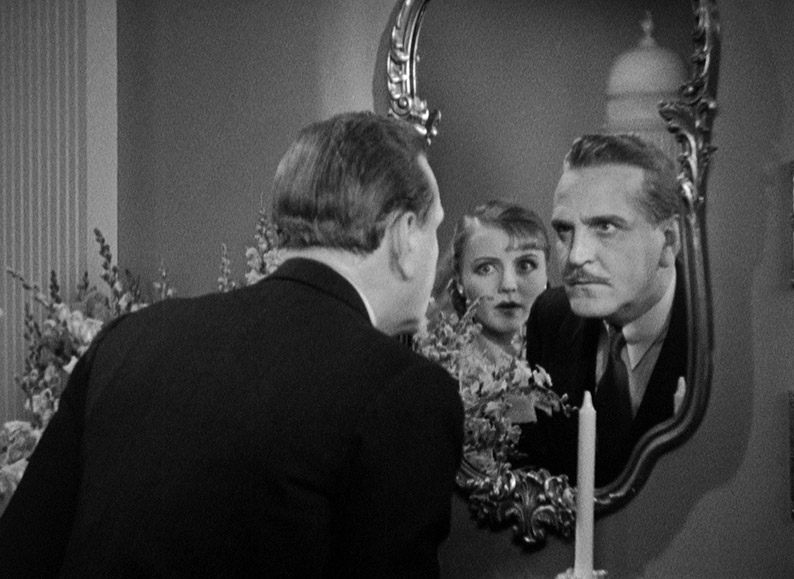
A Shattered Reflection (11:10)
A useful video essay comparing The Kiss Before the Mirror with director James Whale's own 1936 remake, Wives Under Suspicion, which is headed up with a warning for spoilers for both films, particularly important given that their respective endings are amongst the areas covered. Of particular interest are the differences in the personalities of the respective lead characters, and the changes that were likely brought about by the more rigid enforcement of the Production Code when the remake went into production.
Image Gallery contains 22 screens of scalpel-sharp promotional stills, hand-coloured lobby cards, and posters.
Classification of Enlisted Men (1943) (11:57)
An unsurprisingly upbeat armed forces information film looks at how the benignly helpful officers of America's armed forces help place smilingly willing recruits in positions that will take advantage of their civilian skills. There's an instructional element here, with a breakdown provided of the various boxes on something known as the War Department A.G.O. Form 20 card, which is followed by the narrator – presumably in an effort to fire up his audience – delivering the killer line, "Now we can follow this group of selectees and watch their cards being filled out." Can't wait. A couple of minor flourishes (dissolves between the arm patch stripes to illustrate rank progression, for example) lift an otherwise standard slice of recruitment reassurance whose main interest is that it was directed by none other than James Whale. The soundtrack is really tinny, but we make allowances for rare finds like this.
Limited Edition Exclusive Booklet
Running at a healthy 40 pages, this booklet kicks off with the main credits for the film, which is followed by an essay titled Reflections on James Whale by freelance reviewer and film historian Philip Kemp, in which he examined the film and Whale's storytelling, as well as providing some welcome background details on its production. I received the PDF of this booklet late (mainly because I forgot to ask for it), and found myself wincing again as I read so many of the points made in my review also covered here, and with more eloquence. Kemp even quotes some of the very same dialogue! Probably best I didn't see this earlier. Full marks to the Indicator research department for tracking down a short article from a December 1933 edition of the Dudley Evening Dispatch on Whale, who had just returned to his home town for Christmas between work on The Kiss Before the Mirror and The Invisible Man. Nestled alongside this is a piece from the Birmingham Gazette from the same week in which Whale is interviewed about working in Hollywood and his upcoming H.G. Wells adaptation. Up next are extracts from a 1996 issue of Films in Review in which David Del Valle interviews director Curtis Harrington about his friendship with James Whale, which proves fascinating and revealing reading. A couple of hugely positive contemporary reviews are followed by a brief but still useful piece on the short film Classification of Enlisted Men.
A fascinating, sometimes discomforting, and little-discussed film from a hugely talented director known primarily for four game-changing genre movies. For all its moral flaws, it makes for riveting viewing, thanks in no small part to James Whale's stylish direction, Karl Freund's superb cinematography, and William Anthony McGuire's sharp screenplay. Indicator's disc may be lighter on special features than the norm for this label, but it still delivers where it counts. For Whale fans especially, recommended.
|